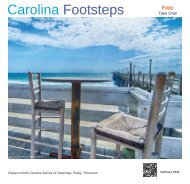Footsteps October 2019
October edition of the Carolina Footsteps now online.
October edition of the Carolina Footsteps now online.
- No tags were found...
Create successful ePaper yourself
Turn your PDF publications into a flip-book with our unique Google optimized e-Paper software.
5 Tips on How to Pay Off That Student Loan Before You’re 30<br />
by: Chloe Anagnos<br />
College isn’t the best option for everyone. Some will do<br />
just as well if not better by learning their craft through<br />
apprenticeships or by simply enrolling in a trade school. But<br />
when college is part of your calling and you simply cannot<br />
juggle a part-time job and school, taking on student loans<br />
might be your only option.<br />
If this is your case, don’t despair. It is true that the government’s<br />
long history of getting involved with the student<br />
loan industry made the situation worse. But despite the<br />
evidence, regulators don’t seem ready to get out of the<br />
picture just yet, meaning the cost of a college education will<br />
continue to rise. To many, this means tens of thousands of<br />
dollars in the red the moment they step out of school. And<br />
if alumni aren’t careful, that reality could affect their credit<br />
and their chances to own a home or even buy a car.<br />
So how do you speed up the process of paying off your student<br />
loan without putting everything you earn toward your<br />
debt? And how can you follow through before turning 30?<br />
Here are five practical tips that literally everyone can follow<br />
to put an end to student debt quickly.<br />
1: Live Frugally<br />
Sounds like your grandpa’s advice, right? That’s because it<br />
is. And you know what? He was right: trimming your budget<br />
never fails. Especially if your first years as a professional<br />
aren’t being spent on high-paying jobs. Furthermore, cutting<br />
your monthly expenses will help you to afford doing<br />
things you love while paying off your debt. Unfortunately,<br />
young people today aren’t as good at saving as the last<br />
generations, so finding ways to stop spending so much<br />
might not be all that easy—at first.<br />
So how do you live frugally in a potentially difficult economy<br />
and with the price of everything on the rise?<br />
2: Find Yourself A Side Gig<br />
Side gigs are in style these days, and that has a lot to do<br />
with student loan debt repayment. After all, a lot of people<br />
find that their single-job income isn’t enough. Like others<br />
who found themselves in need of extra work, you, too,<br />
might have to take on a side gig.<br />
If you have a car, you might want to join Uber or Lyft and do<br />
a little hustling a few days here and there. You could even<br />
rent your car to others who don’t have one. But if neither of<br />
those options will work for you, using sites such as Fiverr<br />
and TaskRabbit to make some extra spending money, or<br />
even renting a room in your home on Airbnb, could do the<br />
trick. You could also be part of mock juries for extra cash,<br />
as lawyers are always trying to test their cases to mock juries<br />
before going to court. To those living near law schools,<br />
this might be extra easy.<br />
In addition to gigs that don’t require any special skills, there<br />
are also side gigs you might be qualified for that could help<br />
you pay off your debt sooner.<br />
If you like dogs, you can become a pet sitter using sites<br />
such as Rover, Petsitter.com, or even looking for opportunities<br />
on Craigslist. And if you have special skills, such as<br />
knowing other languages, you can work as a translator on<br />
Gengo or Upwork or find companies looking for part-time,<br />
remote workers.<br />
You can also use Amazon Mechanical Turk to do easy<br />
tasks like visit websites, identify objects on photos or<br />
videos, fill out surveys, write content, and others that don’t<br />
require much time.<br />
Whatever you do, keep it simple. There are plenty of opportunities,<br />
especially if you can work online and from home in<br />
your spare time.<br />
<strong>October</strong> <strong>2019</strong><br />
Reprinted with permission from fee.org<br />
5: Refinance (But Only If You Meet These Requirements)<br />
The idea of refinancing is to be able to bring your interest<br />
rate low enough that your student loan debt will be faster<br />
to repay. Unfortunately, not everyone is eligible to take this<br />
short cut since it requires good credit and steady employment.<br />
Before considering taking this route, check your credit. If<br />
it’s in the high 600s and you have a history of on-time debt<br />
payments and solid, steady income, then you are a good<br />
candidate for refinancing.<br />
For instance, if you have $50,000 in debt and you refinance<br />
it, lowering your 8.5 percent interest rate to 4.5 percent,<br />
you could end up paying off your debt two years earlier<br />
than you originally expected.<br />
Another advantage of refinancing is that it replaces several<br />
student loans with one private loan. You pay to one service<br />
provider at a lower rate, and you can choose new loan<br />
terms that are shorter and that will help to save you big<br />
bucks in the end. While this may drive your monthly payment<br />
minimums up, it will save you money in the long run<br />
and make your everyday life easier—even if you have to<br />
hustle a bit for a few years before being able to relax and<br />
enjoy your hard-earned money!<br />
However, if you have a federal loan that offers benefits<br />
such as income-driven repayments, refinance won’t be the<br />
best option.<br />
So what are you waiting for?<br />
ECONOMICS 13<br />
By following these practical tips, you should be debt-free<br />
and ready to even start saving for retirement! Think ahead,<br />
friends, and you will go far.<br />
If you live in a big city, explore the idea of having roommates,<br />
especially if you’re close to a college campus.<br />
Former college colleagues might be in the same boat and<br />
might be more than willing to share an apartment with<br />
you. But if that’s not an option, how about finding current<br />
students who are looking to save some money by sharing<br />
a place?<br />
When budgeting for food, remember to keep it simple and<br />
cheap by not going out to eat.<br />
There are countless online accounts that teach you how<br />
to cook simple and cheap meals at home. That means<br />
that if you have access to WiFi, you, too, can conquer the<br />
kitchen. Also, consider slashing Starbucks and other side<br />
expenses that aren’t a necessity from your monthly budget.<br />
You will be surprised to know you could be saving over<br />
$2,000 per year!<br />
Whatever you save, put it toward paying off your debt.<br />
Remember, making more than the minimum payment each<br />
month is the best way to get rid of debt rapidly.<br />
3: Explore Tax Deductions And Other Credits<br />
When working on your tax returns, keep in mind you might<br />
be eligible for student loan interest deductions even if you<br />
don’t itemize your taxes. While some requirements must<br />
be met, this could easily deduct up to $2,500 on your taxes<br />
yearly, helping you to keep more of your money and put it<br />
toward paying off debt.<br />
While taxation is a drag on our efforts to make ends meet,<br />
it’s important to take advantage of any and all tax deductions<br />
we can get. Especially if we’re in the red.<br />
4: Make Extra Payments<br />
Sounds like a no-brainer, right? And that’s because it is.<br />
But simply sending the financing company an extra check<br />
every month won’t do. After all, many firms simply apply<br />
any extra payment to the next month’s bill, and this won’t<br />
help you pay your loan faster.<br />
The right way to send extra payments monthly is to contact<br />
your service provider in advance and instruct them to apply<br />
any extra payment to that month’s due balance without<br />
changing anything about the next month’s due date. By<br />
following this strategy, you could be debt-free years ahead<br />
of schedule.
















